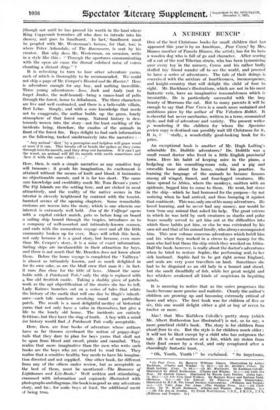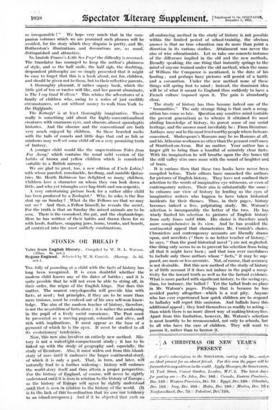A NURSERY BUNCH* - ONE of the best - Christmas - books for
Sinall children that has appeared this year.* by an American:, NT Ce.Ceo,1 by Mrs. Bianco (mother of Pamela Bianco, the artist), has for its hero a wooden dog who is full of go and character. After scoring off a cat of the real Tiberian strain, who has been tyrannizing fiver .every toy in the nursery, Cecco and his rather badly stuffed toy friend wander-off to see the world, and proceed to have a series of adventures. The tale pf their doings is conceived with the mixture of heartlessness, inconsequence, and inight-errantry that will -delight the child of four to eight. Mr. Rackham's illustrations, which are not in his most fantastic vein, have an imaginative reasonableneis which is irresistible. He is particularly successful "with the lazy beauty of Murrums the cat. But to many parents it will be enough to say that Poor Cecco is a much more sustained and ambitious piece by the author of The Velveteen Rabbit. It is cheerful but never saccharine, written in a terse, economical style,- and full of adventure and variety. The present writer is wondering . if the children for whom the Spectator review copy is destined can possibly wait till Christmas for it.
It is, '-ntally, a wonderfully good-looking book for its An exceptional book is another of Mr. Hugh Lofting's admirable Dr. Dolittle adventures? Dr. Dolittle was a small round doctor who lived in a little English provincial town. Here his habit of keeping mice in the piano, a hedgehog on his consulting-room sofa, and a pig and crocodile loose about the house, ruined his practice. So learning the language of the animals he became famous among all winged, finned, and four-legged creatures. His fame spread to Africa, where the monkeys, smitten with an epidemic, begged him to come to them. He went, but stove in the ship--which he had borrowed for the purpose—by not noticing when he had arrived, and thus bumping it against that continent. This was only one of his many adventures. Ire loved learning, and he never had any money, nor would he turn from any animal that asked his help. The great esteem in which he was held by such creatures as sharks and polar bears usually served to get him out of the difficulties intu which these habits put him, or else he was extricated by his own wit and that of his animal family, who always accompanied
This new volume concerns adventures which befell him and his when they worked- in a circus to get. money for the man who had lent theni the ship which they wrecked on Africa. Half the book however, is really about the doctor's adventures when he tried to restore Sophie, the performing seal,. to her sick husband. Sophie had to be got right across England, and seals arc very poor travellers - on land. Sometimes she had to be disguised as an old lady in a bonnet and shawl, but she smelt dreadfully of fish, while her great weight and her whiskers awakened all kinds of suspicions in inquiring minds.
It is amusing to notice that as the series progresses the books become more precise and realistic. Clearly the author's children arc growing up and becoming extremely critical of howl and whys. The first book was- for children of five or six, this one would delight either a girl or boy of seven to twelve or more.
AlaS ! that Miss Kathleen Colville's nretty. story (which Mr. Albert Rutherston has illustrated') is not, so to say, a More yractieal child's book.. The:story is for children from about lour to six. But the style is for-children much older : it wilYnot be liked except by- a child who has outgrown the talc. -tit is of marionettes at a .fair, .WhiCh are stolen from their fond owner by .a rival, and only recaptured after a
chinrilrigly fantastic hunt, - t` Oh, Youth, Youth " -he 'exclaimed. " So impetuous,
* (1) Poor Ceceo. By Margery Williams Bianco. Illustrations by Arthur Backliarn. (Chatto and Windus. 7s. 69.)—(2) Dr. Dolittle's Circus. By Hugh Lofting. (Cape. 7s. 6d.1— (3) Mr. Marionette. By Kathleen Colville. Migrated by Albert Rutherston. (Chatto and Wiudus. 5s.)—(4) Little Sea Dugs. By Anatole France. Illustrated by Marcia Lane Forster. (John Lane. 7s. 6d.)—(5) The Very Good Walkers. By Marjory Royce and Barbara Todd. (Methuen. 7a.)—(8) The Katouts. By Princess Mario Troubetzkoy. Illustrated by H.I.H. The Grand Duchess Gueorgutvna. (Williams and Norgato 5s.)-0) lake from Par deity. (The Sheldon Press. Is.)---(S) Uncle Labia. By W. Heath Robinson. (Chatto and Wiudus. New Edition. 5s.) ---(9) The Zoo on Sunday. By Frank Worthington. F.R.G.S., F 7,.8, (Williams and Norgatc. os.) so irresponsible ! ", We hope very much- that in the com- panion volumes which we are promised such phrases will be avoided, for the story which they disgUise is pretty, and Rutherston's illustrations and decorations are, as usual; distinguished and attractive. In Anatole France's Little Sea Dogs' the difficulty is reversed. The translator has Managed to keep the author's, plainness of style, and so the half smile, the half sigh, the doubting, 'despondent philosophy are so simply presented that it might he easy to forget that this is a book about, not for, children, and should be given not to them, but to their reflective parents A thoroughly pleasant, if rather sugary book, which the ;little girl of ten or twelve will like, and her parent abominate, is The fiery Good Walkers.' This relates the adventures of a family of children wire., owing to a series of just credible circumstances, set out without money to walk from York to the Highlands. The Katoufs" is at leait thoroughly imaginative. There really is something odd about the highly-conventionalized creatures with enormous eyes, and obscure, almost apocalyptic- histories. And the obscure and the conventional are both ,very much enjoyed by children. So these bearded cocks- .with the tails of comets and little dogs that end as fish or rainbows may well set sonic child off on a very promising train -of fantasy. , A younger child would like the unpretentious Tales from Far Away,7 which contains the usual mild version of the habits of brown and yellow children which is considered suitable to a British nursery. We are glad t6 -greet, too; a new edition of Uncle Lubin,} with whose puzzled, ramshackle, far-flung, and amiable Quix6- tries Mr. Heath Robinson has delighted so many children. Children love a character on whom they can look down a little, andd-whO yet triumphs over bag-birds and sea-serpents. - A very entertaining picture book for a rather older child has been produced by a Zoologist.' Why, he asks, is the Zoo shut, up on Sunday? What do the Fellows see that we may not see ? And then, a Fellow himself, he reveals the secret. For the truth is that on Sunday the mixed animals are to be seen. There is the crocodowl, the gat, and the elephantelope. !Here he has written of their habits and drawn them for us with hoofs, feathers, snapping jaws, horns, trunks, and beards-, all contrived into the most unlikely combinations.



































































 Previous page
Previous page